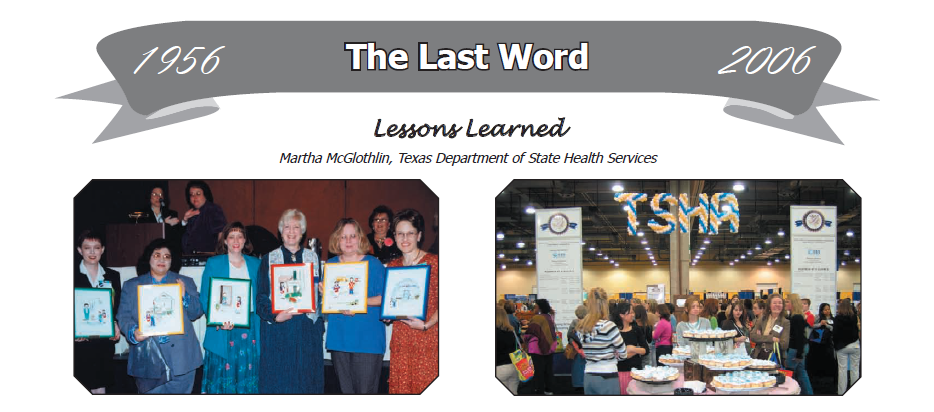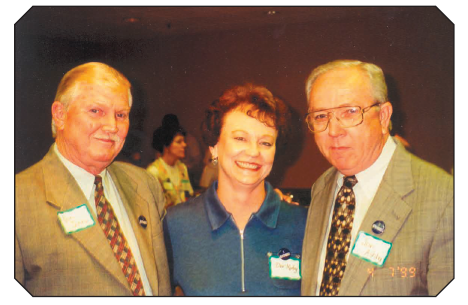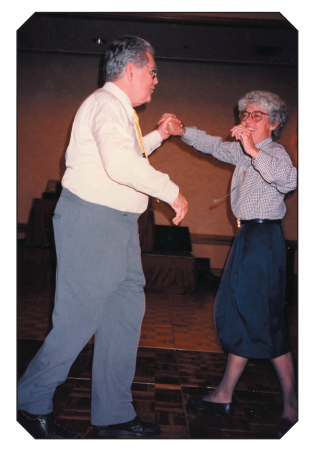Walk Through TSHA's History

When a disaster such as Hurricane Katrina occurs, those persons involved in the response write an After Action Report and identify what worked, what needs improvement, and the lessons learned from that response. We decided to focus this Last Word on the lessons the TSHA and our professions have learned over the last 25 years. Taking a retrospective look can inform planning for the future. What are the characteristics of the TSHA that have allowed it to continue to grow and thrive over these last 25 years? Most certainly: commitment to the professions and those whom we serve; leadership; collaboration; becoming informed about and actively involved in the legislative process; adapting to a constantly changing environment, including evidence-based practice, taking initiative, and being proactive and fiscally responsible; investing in students; and recognizing the importance of volunteers.
Evidenced-Based Practice: Perhaps one of the most important lessons the professions have learned is that we must be able to prove that the services we provide are evidenced-based, that science and best practices underlie what we do, that we can “prove” the persons with whom we work do make measurable progress. In a sense, everyone who provides services has become a researcher, learning to better document outcomes.
Collaboration: Some lessons have been learned both by the TSHA and the professions. One involves the importance of collaboration. Through collaboration with other professionals who interact with the persons we serve, we enhance the work we do. Audiologists work with teachers who have in their classrooms children with a hearing impairment; speech-language pathologists work collaboratively with occupational therapists, physical therapists, teachers, and medical personnel. We should not work in isolation but in collaboration with family and caregivers, and with other professionals interacting with our patients or clients. Likewise, through working with related professional associations, our Association has complemented our efforts in addressing legislative and policy issues.
Active Involvement in the Legislative Process: Without the TSHA members learning about and becoming actively involved in the legislative process, this state would likely not have licensure for speech-language pathologists and audiologists. Members have learned the value of becoming acquainted with their elected officials and of meeting with legislators and their aides to discuss issues of critical importance to the professions.

Fiscal Responsibility: As many associations have learned, fiscal responsibility is key to having a financially healthy organization. Members of the TSHA work hard for their salaries, and they want to know that the TSHA Executive Board and the Financial Advisory Committee are being fiscally responsible in how dues and Convention registration fees are invested and expended. A goal for the TSHA established many years ago was to have in reserve at least one year’s operational expenses. This goal was achieved in the late 1990s. Through this financial planning, if the TSHA AnnualConvention had to be canceled and the revenue from this important event was not realized, the Association could continue to operate. An example of the importance of this financial cushion: If the TSHA Annual Convention had been scheduled for September 2005, it could have been canceled because of Hurricanes Katrina and Rita, and the revenue from the Annual Convention would not have been realized.
Association Management: In every association, regardless of its size, volunteers are essential. However, the TSHA learned that as the membership grew, handling the day-to-day operations of the Association became more than a full-time job, more of a time commitment that could be expected of volunteers. The Executive Board made the prudent decision to employ a professional management firm whose skills and expertise would augment and complement that of the Association’s tremendous volunteers.

Investment in Students: Equally important as wise management of our fiscal resources has been the TSHA’s investment in students. The future leaders of our professions and the TSHA are in university classrooms around the state. Creating ways for students to become actively involved with the TSHA before they graduate has been a focus for the TSHA Board and Council. What would the Annual Convention be without the highly competitive Praxis Bowl? The student perspective is so important that two students now serve as ex-officio members of the TSHA Executive Board.
Business Practice: Members of our professions have learned that in order to be successful, they needed knowledge of sound business practices in addition to their professional expertise. Negotiating contracts with third-party payers became a part of business operations. Students graduating with a degree in communication disorders, speech-language pathology, or audiology in the early 1970s usually did not take courses in business or marketing. However, these skills are essential to building and maintaining a successful practice. As the interest in private practice increased among its members, TSHA responded in a variety of ways, including the creation of a Private Practice Task Force and an Insurance Task Force. Over the years at the TSHA Annual Convention, the number of sessions focusing on private practice has steadily increased.
Leadership: A professional organization cannot sustain or grow without effective leadership. The TSHA has long been committed to mentoring future leaders. If you ask any current or former Executive Board or Council members, they will tell you that along their professional journey someone took them under his or her wing, encouraged them to become active in the TSHA, and mentored them. Without mentoring, recognition, and nurturing of future leaders, the TSHA would not have survived. So, as we look back, we say “thank you” to those visionary leaders who so many years ago created our Association. We express our appreciation to each and every member, to each one who has served this wonderful Association as a member of a board, a committee, a task force, and to those who stepped forward and were willing to be elected to office. We have learned a lot over the last 25 years. Together we have built a solid foundation for this Association. Now it is up to our future leaders. What’s to come for TSHA and our professions will likely be challenging, but if our history is any indicator, we will continue to grow and flourish. Here’s to the future!
"We must not take our heritage too lightly, nor be too tied to the past. The leaders of the last 26 years and the evolution of our association should be used for perspective, and for adaptation."
Mary Lovey Wood, 1983 TSHA President